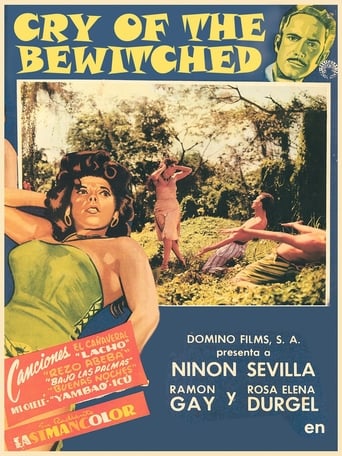



ridiculous rating
Dreadfully Boring
This is a must-see and one of the best documentaries - and films - of this year.
View MoreThe film's masterful storytelling did its job. The message was clear. No need to overdo.
View MoreI had never expected to hear Ninón Sevilla delivering her lines in English. Although she was dubbed, for the movement of her lips it is obvious that Ninón was saying her lines in English, so I deduced that it was also shot in English for an American version distributed in the United States. I do not know if this version is the only one in color that survived after the vaults of the Mexican national film archive caught fire in 1982 and many negatives and first copies were forever destroyed. Although there is a low resolution copy available in Spanish, it is in black and white, I opted for this foreign version, so the vision of this melodrama, which by itself is already psychotronic, definitely became a weird experience. A while ago I saw Ninón in "Mulata", another film dealing with Santería, but in "Yambaó" there are elements of fantasy: while it is true that there is a respectful treatment of the Yoruba religion (never called "voodoo", as in many American and European films or comments here in IMDb, that make no distinctions among African cults), here we find possessions of spirits and the power of magical brews and invocations. Everything else is natural: prestigious composer Obdulio Morales Ríos wrote the ritual music; musical direction was by Lan Adomian, the Russian-American who wrote the Republican hymn during the Spanish Civil War; and the dances were staged by Rodney, the famous choreographer of the Tropicana cabaret. To reinforce the ethnic-folkloric aspects several Cuban singers are featured: Olga Guillot sings a duet with Ninón, Xiomara Alfaro sings in a funeral scene, and Celina Reynoso plays the landowner's nanny, while there are cameos by popular Paulina Álvarez, the so-called "Queen of Danzonete", and Haitian singer Martha Jean Claude. Also all the dances were shot in exteriors: in fact, almost all the action takes place in open spaces, except for the cave where Yambaó hides with her aunt, the white landlord's hacienda, and the shack where the lovers meet. At first glance it seems that the plot of "Yambaó" takes elements from Cirilo Villaverde's "Cecilia Valdés", known as the national novel of Cuba. But in general what happens in the film is quite common in the island, as well as in most of Latin American countries: in short, it is the typical story of the delirious passion of a mulatto woman for a white man (and vice versa). The cult of the white Spanish man (and the rest of the Caucasian men) is a curious racist introjection. I have never forgotten when a Cuban film student referred to a handsome man he had met, saying "He was so beautiful that he seemed a Spanish man!" This admiration has its complement in a highly favored Cuban cultural trait, which I call "mulattism": the adoration of the mulatto stereotype consists in worshiping mulattoes of both sexes as the epitome of crossbreeding beauty and sensuality. It is very common in the island, where almost all the indigenous people were slaughtered. The drama of the mulatta Yambaó (Ninón) is falling in love with the Caucasian owner and ruler of a cane field in 1850. The woman was raised in freedom by her aunt Caridad, a black slave and santera, who knows about spells, love knots and magic powders. Everybody thinks Caridad died when the previous owner sent her into exile. But Caridad returns with her niece Yambaó and a plan for revenge that will be executed by the young woman: she has to kill the son of the old boss, who is the new owner of the fields (Ramón Gay, who could equally fight the Aztec mummy and doll people, or appear in a drama by Roberto Gavaldón). But Yambaó likes the "whitey" and Caridad's plan screws up. Here Ninón is far from her best works. She was no longer the slender beauty, wears an unbecoming brunette wig and was directed by a rather gray filmmaker, Alfredo B. Crevenna, who had better luck in other projects. But, of course, Ninón is Ninón and as always she dances with passion, and confronts her opposites with her hands on hips and raising her chin. One enjoys her dance and performance, but "Yambaó" is saved above everything else by its music, dances, singers, landscapes of the Cuban countryside and Eastmancolor.
View MoreIt's voodoo love on an 1850 Cuban slave plantation once a native girl puts a spell on its white master...Very reminiscent of WHITE CARGO (with a little BIRD OF PARADISE thrown in) only this "Tondelayo" isn't really a bad sort since she's obliged to avenge an ancestor put to death (maybe) for witchcraft but falls for her intended victim instead. The striking color cinematography (which won a Silver Ariel, Mexico's Oscar) vividly captures the sprawling hacienda and its sugar cane fields along with the slaves' endless ululating and uninhibited undulating led by perky Ninón Sevilla as the titular temptress who, at one point, steals the master's clothes and rubs them all over herself until he comes to her in a trance. Yambaó never changes her outfit (a one-piece loincloth and sabertooth necklace right out of ONE MILLION BC) and never gets dirty from all that rolling around on the ground with and without her hypnotized lover (Ramón Gay, billed as Raymond Guy for U.S. consumption). One of the silliest things I've seen in quite some time and I loved every foolish minute of it. A 10/10 in demented entertainment.
View MoreSteamy passions and evil brew on a Cuban sugar plantation in 1850 Cuba. Fifteen years after the execution of an evil black witch, her daughter, (who has been trained in the black arts and subjugated to her crippled grandmother's hatred and plot for revenge) becomes severely conflicted when ordered to kill man she loves, the married Spanish master who freed her. The evil forces unleashed when thwarted finally redound with disaster upon they're perpetrators. A colorful and interesting period piece which is more credible than a mere horror film. Recommended for an unusual story line and the stirring setting with the many Afro-Cuban ethnic sequences portraying slave life in the region of that time and place.
View MoreYambao is a charming sorceress, under influence of her grandmother's spirit, greeding for revenge. She leads us thru this story of unusual passion and possession. But the film doesn't stand the pace.. long scenes of chanting slaves, althought sometimes (unvolontary ?) very funny, break the tempo and make us regret what this genre movie could have been
View More